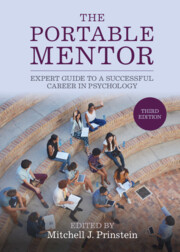Book contents
- The Portable Mentor
- The Portable Mentor
- Copyright page
- Dedication
- Contents
- Figures
- Tables
- Boxes
- Contributors
- Preface
- Acknowledgments
- Part I Applying to Graduate School
- Part II Beginning your Career
- 3 Your First Year of Graduate School
- 4 Following the Scientific Path in Applied Psychology
- 5 Impostor Syndrome in Graduate School
- 6 Cultural Humility in Psychology
- 7 Graduate Training for Students of Color: Belonging Required; Fitting In, Not Recommended
- 8 Navigating Graduate School in Psychology as a Sexual and/or Gender Minority (LGBTQ+) Student
- 9 Considerations for First-Generation Students in Graduate School
- 10 Developing and Practicing Ethics
- Part III Your Research/Academic Career
- Part IV Your Career as a Practitioner
- Part V Your Professional Service Career
- Part VI Your Career After Graduate School
- Index
- References
9 - Considerations for First-Generation Students in Graduate School
from Part II - Beginning your Career
Published online by Cambridge University Press: 21 July 2022
- The Portable Mentor
- The Portable Mentor
- Copyright page
- Dedication
- Contents
- Figures
- Tables
- Boxes
- Contributors
- Preface
- Acknowledgments
- Part I Applying to Graduate School
- Part II Beginning your Career
- 3 Your First Year of Graduate School
- 4 Following the Scientific Path in Applied Psychology
- 5 Impostor Syndrome in Graduate School
- 6 Cultural Humility in Psychology
- 7 Graduate Training for Students of Color: Belonging Required; Fitting In, Not Recommended
- 8 Navigating Graduate School in Psychology as a Sexual and/or Gender Minority (LGBTQ+) Student
- 9 Considerations for First-Generation Students in Graduate School
- 10 Developing and Practicing Ethics
- Part III Your Research/Academic Career
- Part IV Your Career as a Practitioner
- Part V Your Professional Service Career
- Part VI Your Career After Graduate School
- Index
- References
Summary
Many graduate programs are sincerely invested in fostering diversity and increasing the number of students from underrepresented backgrounds who will contribute to our discipline.But increasing representation is only one step needed to address inequities, disparities, and injustices.Helping all students thrive, and have an equal opportunity to achieve their educational goals requires the creation of “safe spaces” in which demographic differences are understood, appreciated, and considered in larger educational systems.This chapter discusses a frequently overlooked identity characteristic that can significantly impact the graduate school experience:being a first-generation college student.
- Type
- Chapter
- Information
- The Portable MentorExpert Guide to a Successful Career in Psychology, pp. 166 - 178Publisher: Cambridge University PressPrint publication year: 2022



